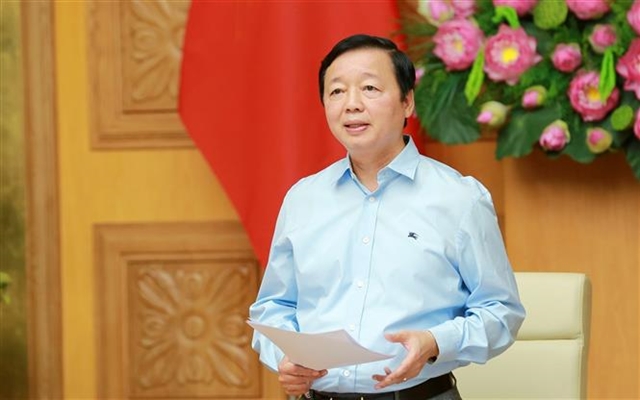 Politics & Law
Politics & Law


|
| Deputy Prime Minister Trần Hồng Hà at the meeting. VNA/VNS Photo |
HÀ NỘI — Deputy Prime Minister Trần Hồng Hà yesterday presided over a meeting of the National Appraisal Council of the National Energy Master Plan for the 2021-2030 period, with a vision to 2050.
During the meeting, a set of technology criteria was developed to select new energy projects.
Addressing the meeting, Deputy PM Hà stressed that the draft plan closely adhered to the assigned task. It incorporated an updated construction methodology and energy sub-sector plans, such as the National Power Development Plan for the 2021-30 period, with a vision to 2050 (PDP VIII).
He requested that all comments provided during the meeting be fully considered. The consulting unit, namely the Ministry of Industry and Trade, was urged to conduct a comprehensive and specific evaluation of the energy sector planning over the past ten years. Special attention should be given to ensuring energy security in the context of the COVID-19 pandemic's impact and energy fluctuations resulting from the Russia-Ukraine conflict.
This evaluation should identify both objective and subjective factors, draw lessons from experience, and update data on the current situation regarding commitments to reduce net greenhouse gas emissions to zero and energy transition trends. These efforts will help in forecasting for the future.
The Deputy PM emphasised that the plan should incorporate new perspectives and important tasks in determining the relationship and coordination mechanism between energy sub-sectors such as coal, oil and gas, electricity, and renewable energy. It should be consistent with other plans, including land use planning, marine spatial planning, and so on.
"The planning must demonstrate a consistent approach, strictly adhere to Việt Nam's commitments on net zero, the Just Energy Transition Partnership (JETP), and energy sub-sectoral plans, particularly the approved Plan VIII. Additionally, it should propose solutions that maximise the economic efficiency of utilising natural resources and fossil energy sources such as coal, oil, and gas," Hà said.
In agreement with the "dynamic and open" approach of the plan, the Deputy Prime Minister said that this mindset should not only apply to energy transition but also to ensuring energy security. The Ministry of Industry and Trade will take on the primary responsibility for reviewing and creating a list of key energy projects that are currently being implemented or have potential. They will also develop a set of criteria, including technology and economic efficiency, to select new or converted energy projects.
"The potential for energy sources is limitless, but the projects must be specific," Hà said.
He further requested that the plan should include provisions for investing in scientific and technological research on converting fossil fuels into new forms of primary energy, such as green hydrogen and ammonia. Additionally, it should explore the development of new energy sources like nuclear power, geothermal energy, wave-tidal energy, solar heat, which can be harnessed in the future.
Furthermore, efforts should be made to establish several clean energy centers.
According to the report from the consulting unit, the draft plan aims to ensure sufficient energy supply in the country and meet the socio-economic development goals, with an average GDP growth rate of around 7 per cent per year in the period from 2021 to 2030, and approximately 6.5-7.5 per cent in the period leading up to 2050.
The share of renewable energy in the total primary energy is projected to reach 15-20 per cent by 2030, with a long-term target of about 80-85 per cent by 2050.
Việt Nam intends to develop an independent and self-sufficient energy industry, building an overall energy ecosystem based on renewable and new energy sources. The goal is to establish and develop multiple clean energy centres by 2030. The production scale of green hydrogen is expected to reach around 100,000-200,000 tonnes per year, with a long-term vision of 10 million to 20 million tonnes per year by 2050.
During the meeting, experts highlighted that the draft plan closely aligns with growth goals and considers various scenarios. The "dynamic and open" planning approach is designed to address unpredictable fluctuations in energy inputs and the rapid advancement of energy technology.
Deputy Minister of Science and Technology Nguyễn Văn Tùng, stressed the need for the plan to include research on new energy technologies, environmental treatment, digital technology-based database construction, and digital conversion. He also mentioned the importance of establishing a new system of standards and regulations in the energy sector. VNS




